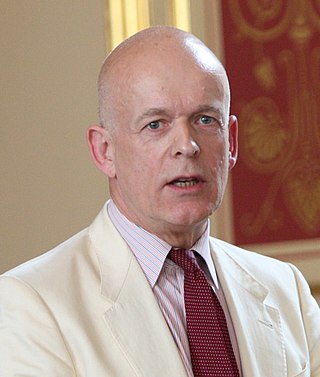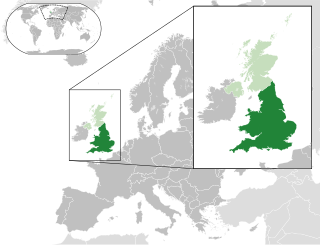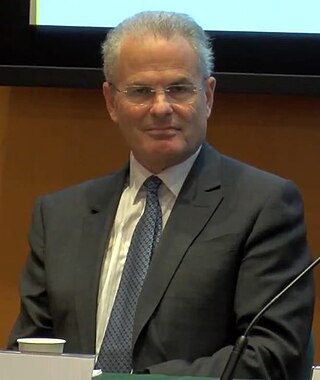Legal career
Etherton was called to the bar (Gray's Inn) in 1974 and became a Queen's Counsel in 1990. He was appointed a High Court judge on 11 January 2001 [6] and assigned to the Chancery Division,receiving the customary knighthood. In August 2006,he was appointed Chairman of the Law Commission, [7] the statutory independent body created by the Law Commissions Act 1965 to keep the law under review and to recommend reform where needed.
On 29 September 2008,on expansion of the Court of Appeal from 37 to 38 judges,Etherton was appointed as a Lord Justice of Appeal. He was sworn in on 29 September 2008, [8] and received the customary appointment to the Privy Council. On 11 January 2013,he was appointed Chancellor of the High Court. [9]
On 3 October 2016,Etherton succeeded Lord Dyson as Master of the Rolls. [10]
In October 2016 Etherton was one of the three judges forming the divisional court of the High Court in proceedings concerning the use of the royal prerogative for the issue of notification in accordance with Article 50 of the Treaty on European Union (the Lisbon Treaty) (Santos and Miller,Applicants -v- Secretary of State for Exiting the European Union,Respondent). His role in this judgment meant that he appeared in an infamous front-cover of the Daily Mail ( Enemies of the People ),and in a move which was widely seen as attacking his homosexuality,the Mail Online chastised Etherton for being an "openly-gay ex-Olympic fencer". [11] [12] [13] [14] The reference was swiftly removed,though without apology.
In June 2019,Etherton,Sir Stephen Irwin and Sir Rabinder Singh found that ministers had breached British law when they "made no concluded assessments of whether the Saudi-led coalition had committed violations of international humanitarian law in the past,during the Yemen conflict,and made no attempt to do so." [15] [16]

The Keeper or Master of the Rolls and Records of the Chancery of England, known as the Master of the Rolls, is the President of the Civil Division of the Court of Appeal of England and Wales and Head of Civil Justice. As a judge, the Master of the Rolls is second in seniority in England and Wales only to the Lord Chief Justice. The position dates from at least 1286, although it is believed that the office probably existed earlier than that.

Harry Kenneth Woolf, Baron Woolf is a British life peer and retired barrister and judge. He was Master of the Rolls from 1996 until 2000 and Lord Chief Justice of England and Wales from 2000 until 2005. The Constitutional Reform Act 2005 made him the first Lord Chief Justice to be President of the Courts of England and Wales. He was a Non-Permanent Judge of the Court of Final Appeal of Hong Kong from 2003 to 2012. He sits in the House of Lords as a crossbencher.

Nathaniel Lindley, Baron Lindley, was an English judge.

The chancellor of the High Court is the head of the Chancery Division of the High Court of Justice of England and Wales. This judge and the other two heads of divisions sit by virtue of their offices often, as and when their expertise is deemed relevant, in a panel in the Court of Appeal. As such this judge ranks equally to the President of the Family Division and the President of the King's Bench Division.

Jonathan Hugh Mance, Baron Mance, is a retired British judge who was formerly Deputy President of the Supreme Court of the United Kingdom.

There are various levels of judiciary in England and Wales—different types of courts have different styles of judges. They also form a strict hierarchy of importance, in line with the order of the courts in which they sit, so that judges of the Court of Appeal of England and Wales are given more weight than district judges sitting in county courts and magistrates' courts. On 1 April 2020 there were 3,174 judges in post in England and Wales. Some judges with United Kingdom-wide jurisdiction also sit in England and Wales, particularly Justices of the United Kingdom Supreme Court and members of the tribunals judiciary.

"Enemies of the People" was the headline to an article by the political editor James Slack, published in the British newspaper Daily Mail on 4 November 2016. The headline and associated article were about the three judges who had ruled that the UK Government would require the consent of Parliament to give notice of Brexit. The headline was widely criticised as being inappropriately condemnatory and attracted numerous complaints, given that the British judiciary is independent of the Government. The court had ruled on the question of whether the Constitution of the United Kingdom permitted the government to use the royal prerogative to invoke Article 50.

Sir Adrian Bruce Fulford is a retired Lord Justice of Appeal. From 2017 to 2019, he was the first Investigatory Powers Commissioner, and was the Vice-President of the Court of Appeal in 2019, succeeding Lady Justice Hallett.

Sir Richard Rashleigh Folliott Scott, Baron Scott of Foscote, is a British judge, who formerly held the office of Lord of Appeal in Ordinary.

In England and Wales the Law Commission is an independent law commission set up by Parliament by the Law Commissions Act 1965 to keep the law of England and Wales under review and to recommend reforms. The organisation is headed by a Chair and four Law Commissioners. It proposes changes to the law that will make the law simpler, more accessible, fairer, modern and more cost-effective. It consults widely on its proposals and in the light of the responses to public consultation, it presents recommendations to the UK Parliament that, if legislated upon, would implement its law reform recommendations. The commission is part of the Commonwealth Association of Law Reform Agencies.

John Anthony Dyson, Lord Dyson, is a former British judge and barrister. He was Master of the Rolls and Head of Civil Justice, the second most senior judge in England and Wales, from 2012 to 2016, and a Justice of the Supreme Court of the United Kingdom from 2010 to 2012. He was the first justice to be appointed who was not a peer.

Roger John Laugharne Thomas, Baron Thomas of Cwmgiedd, FLSW is a British judge. He served as Lord Chief Justice of England and Wales from 2013 to 2017.
Sir Richard John Pearson Aikens PC is a retired British judge, who was a Lord Justice of Appeal from 2008 to 2015.
Sir David Michael Bean is a British judge of the Court of Appeal of England and Wales.

Sir Geoffrey Charles Vos is a judge in England and Wales. Since January 2021, he has held the positions of Master of the Rolls and the Head of Civil Justice in England and Wales.
Sir Stephen John Irwin, is a retired British judge and barrister. From September 2016 until October 2020, he was a Lord Justice of Appeal. From May 2006 to 2016, he served as a judge of the High Court of England and Wales.

R (Miller) v Secretary of State for Exiting the European Union is a United Kingdom constitutional law case decided by the United Kingdom Supreme Court on 24 January 2017, which ruled that the British Government might not initiate withdrawal from the European Union by formal notification to the Council of the European Union as prescribed by Article 50 of the Treaty on European Union without an Act of Parliament giving the government Parliament's permission to do so. Two days later, the government responded by bringing to Parliament the European Union Act 2017 for first reading in the House of Commons on 26 January 2017. The case is informally referred to as "the Miller case" or "Miller I".

Sir Peter Donald Fraser PC, styled The Right Honourable Lord Justice Fraser, is a Judge of the Court of Appeal of England and Wales.
Sir Charles Gregory Bourne is a British High Court judge.

The King's Bench Division of the High Court of Justice deals with a wide range of common law cases and has supervisory responsibility over certain lower courts.















